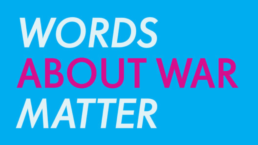The words we use to describe war and foreign policy matter, and they have far reaching implications for policymaking.
From George Orwell’s critique of the language of totalitarian regimes to today, discussions of war and foreign policy have been full of dehumanizing euphemisms, bloodless jargon, little-known government acronyms, and troubling metaphors that hide warfare’s damage.
Think of “collateral damage” (civilian deaths), “overseas contingency operations” (wars), and “bug splat” (killing human beings with drone-fired missiles).

This guide aims to help people write and talk about war and foreign policy more accurately, more honestly, and in ways people outside the elite Washington, DC foreign policy “blob” can understand.
We encourage you to use this guide, to share it with others, and to adapt it as necessary to local contexts. The guide should be especially helpful to journalists and other writers, podcasters and vloggers, policy analysts, teachers, scholars, and people involved in public education projects.
Recent Posts
Israel and American Hawks are Pushing U.S. to Iran War With Catastrophic Consequences
February 23, 2026
Take Action Now At the World Health Assembly in May, member states may endorse an unprecedented strategy declaring that health is not a cost – but…
A Child’s View of the Attack on Venezuela. And a Peace Flotilla
February 23, 2026
Take Action Now At the World Health Assembly in May, member states may endorse an unprecedented strategy declaring that health is not a cost – but…
How to Organize Safely in the Age of Surveillance
February 22, 2026
Take Action Now From threat modeling to encrypted collaboration apps, we’ve collected experts’ tips and tools for safely and effectively building a…
‘The Siege Must Be Broken’: Countries Called to Ship Fuel to Cuba After Trump Tariffs Struck Down
February 21, 2026
Take Action Now The US Supreme Court’s ruling “implies that Trump’s recent order imposing tariffs on countries selling oil to Cuba exceeds the…




